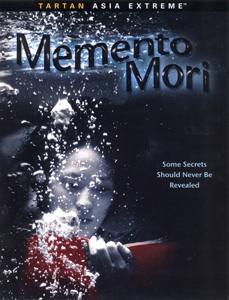Film
Index
Subtitles: Ordinarily, I prefer my foreign language films subtitled. Granted, watching subtitled films is an accquired skill, and a great many people cannot master it, but I prefer to hear the original cadence of the language in which the film was made (the exception to this is Italian cinema of a certain vintage, which is dubbed no matter how one gets it). But every so often, I'll run into something that makes me rethink this. Such a moment occurs in Memento Mori, a sequel in name only to 1998's Whispering Corridors. The heroine of the movie hears a ghostly whisper. As this whisper appears on the soundtrack, it's atmospheric, subtle, and almost subliminal. Tartan's new DVD, unfortunately, translates the whisper with the same type style as the rest of the subtitles. This is the big problem with subtitles. Everything has equal weight. What should be a small epiphany that sends a charge into the hindbrain of the viewer is diffused. Which is unfortunate. But I suspect that I'm getting ahead of myself...
Sequels: Memento Mori, like its predecessor, is set in a Korean girls' school. Like its predecessor, it is concerned with the interior lives of teenaged girls and the friendships of teenaged girls in an institutional setting. Like it's predecessor, the institutional setting is broken to the point where it is destroying its charges. Even if it isn't a sequel in actual fact, Memento Mori is certainly a thematic sequel.
The plot here differs somewhat from the previous film. Instead of a murderous ghost girl, we have a haunted diary. Instead of an intense friendship, we have a taboo lesbian subtext. And instead of the linear progression of narrative, we have a fractured narrative that plunges backwards and forward at a whim. The diary provides a useful framework for this. But the most striking difference is in the craft with which the film is made. Don't get me wrong, Whispering Corridors was well made within the confines of a generic construction, but Memento Mori is more than well-made, it is singularly accomplished. The film benefits from the way its directors ignore that they are making a horror movie for great whacks of its running time. There is a striking naturalism on display here. The girls in this film seem like real girls. The social situations seem like real social situations. The horror film elements of the film seem almost an intrusion on this. The directors' facility with actors is strongly evident. Shot for shot, edit for edit, the formal elements of the film are superb, too. Like A Tale of Two Sisters, Memento Mori is a marvel of film craft.
Fractures: Where Memento Mori stumbles is in its fractured narrative. Because the film places the ghost of one character in the present, it is sometimes confusing when the same character inhabits a flashback. One is never sure of the present or past tense in this film, almost from frame one. While this may in fact be the intent of the filmmakers, I found it a little distracting. The movie is fractured, too, between the filmmakers' intent to make a heartbreaking lesbian coming-of-age story, and their requirement to make a horror movie. The seams between the horror film and the drama are in full view, which is too bad, really. Individually, the horror film elements and the dramatic elements are very strong, but they don't mesh particularly well. An audience for a lesbian drama will be in the same boat as the audience for horror movies: this film will completely satisfy neither audience.
But these are all minor quibbles. The film as a whole understands that the horror idiom is a powerful mirror for all sorts of psychological states, and in the end, it IS successful in communicating those states. Memento Mori diverges from the usual function of the horror movie in so far as it isn't trying to instill fear and revulsion in the audience (although it instills both of these emotions at select points during its running time). It is, rather, interested in sorrow, mourning, unrequited love, and the thousand natural shocks of adolescence. Melancholia is one of the traditional modes of gothic fiction (as opposed to "horror" fiction), and this is a deeply melancholy movie. The final shot of the film--a flashback--is as sad as they come.

6/10/05